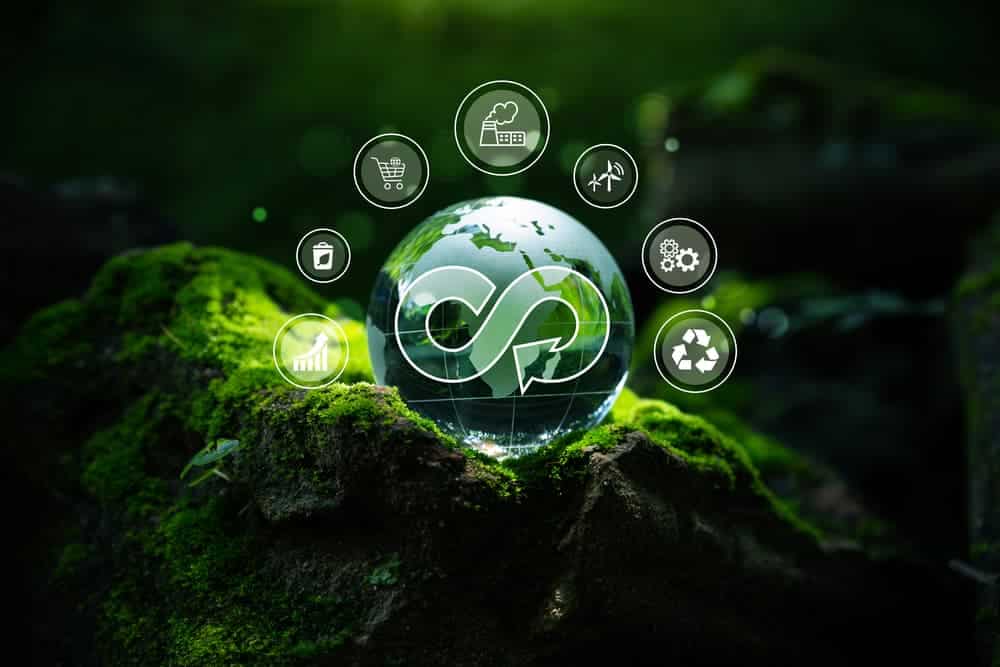Our society depends on a global economy comprised of businesses of all sizes, each intent on fulfilling needs. They distribute products and services, but when their material sources are not reusable, more products reach landfills, and the excessive use of non-renewable resources takes a toll on the environment. Regenerative energy procurement with circular economy principles can put an end to this.
Summary
- Circular economy principles disrupt “take-make-waste” by extending product life cycles through repair, reuse, and recycling to reduce landfill waste.
- Renewable energy generation and procurement reduce environmental stress through onsite systems, green energy credits, and direct power agreements.
- Understand how these practices can positively impact the environment while reducing costs.
- Manufacturers reduce costs by recycling and refurbishing materials, lowering consumer prices.
What Are Circular Economy Principles?
Circular economy principles first took root in China, disrupting the traditional “take, make, waste” consumerism ideal and interjecting a restorative approach. By doing so, they turned the linear business model that always led to the burning or tossing of goods into a more circular one where the goods get a new lease on life after restoration or recycling.
By extending the life cycle of each product, they stay out of landfills longer while still satisfying individuals’ needs. These principles also include creating sturdier product designs so items like cars, structures, and devices have an extended lifespan. That means individuals can use and reuse the items long before they even recycle them.
How Renewable Energy Procurement Helps the Environment
Circular economy principles can also apply to energy procurement. The three options below are top-rated and can reduce stress on the environment.
1. Renewable Energy Generation Onsite
Generating renewable energy onsite means installing equipment on your residential or commercial estate that harnesses the power of the natural elements. For instance, windmills that utilize wind power, solar panels that absorb UV rays, and even water-source heat pumps that draw warm and cool temperatures from nearby bodies of water limit your dependence on an energy supplier.
These onsite generation products create a long-term natural local utility site and store energy when in abundance, allowing you to use it when in high demand. Using clean energy also makes your energy source more reliable than disappearing non-renewable fossil fuels. It releases less carbon dioxide into the atmosphere that would otherwise contribute to greenhouse gasses.
2. Purchasing Renewable Resources
If you live in an area where installing onsite generators isn’t ideal, meaning you may not get enough sun or don’t have the space for the installation, consider purchasing renewable resources from your gas and electricity company. Usually, these utility companies offer a premium option, especially for commercial estates, so that they can buy energy with an “energy attribute certificate.”
In some cases, utility companies sell natural resources as blocks, with every 100 KWh selling at a fixed monthly cost. The buyers either purchase as many blocks as necessary to run their business or purchase a percentage that reflects their unique monthly energy usage. Unlike the former, however, the latter energy procurement option mixes conventional and green power.
3. Long-Term Power Purchasing Agreements
Suppose your estate, such as a wind farm or solar power plant, heavily depends on natural power. In that case, you should cut out the mediator and go directly to the source when purchasing power to reduce energy costs. That way, your third-party energy supplier is the power producer with whom you set up a long-term power purchasing agreement.
You have the flexibility to work out the agreement duration, cost, and insurance type, and you also have a say in what source your renewable energy comes from.
However, like with onsite generators, you’ll need a base load component on your property to store your energy when it’s in high demand. If you don’t have this battery storage, you’ll need a sleeved PPA at an additional cost that’ll sleeve your energy to its intake point.
How Commercial Energy Procurement Helps Individuals
Aside from aiding the environment, commercial energy procurement also helps individuals in a circular economy by lowering utility costs. Although installing solar panels, windmills, or other devices on your property may have a large upfront installation cost, they pay for themselves in the long run and eventually turn a profit for you.
That’s because when you depend on the natural elements to provide renewable resources, you pull less energy from your utility grid and rely more on naturally generated power that doesn’t cost a thing to create. Therefore, you’ll have little to no monthly bills, depending on how much green energy your generators produce. But that’s not the only way you save when procuring energy.
Government Incentives for Energy Procurement Solutions
Whether you’re investing in a newer HVAC model that takes less energy to run or mounting solar panels on your rooftop, government financial incentives make it easier for individuals to make the switch. By offering federal tax incentives or credits, the Department of Energy, the Department of Agriculture, and many other government agencies encourage the production and use of greener energy.
In many parts of the US, the government also offers performance-based incentive schemes where individuals receive funds or credits based on their measured improvements when reaching their target goal.
You may also receive a property-assessed clean energy financing loan. PACE programs let you upgrade your home or business while reaping the benefits of clean energy as soon as possible, even if you can’t currently afford it. Instead, you use a flexible payment plan to pay it off in increments.
Purchasing Items at a Lower Price Point in a Circular Economy
Manufacturers reduce energy costs when recycling or refurbishing clothing, devices, and other materials since they don’t have to find and implement virgin materials into their products. Instead, they save on production costs while releasing less CO2 into the environment, which means you also pay less for the product.
As for energy procurement services, renting clothes and using on-demand car services (among other services) can help you get more while spending less in a circular economy.
Navigate Your Business in the Right Direction!
While we still depend heavily on finite resources, the government urges business owners to reduce their carbon footprint by going green.
Whether you need assistance finding the best energy contracts to suit your business’s unique needs or are a homeowner simply looking to save a few bucks while helping the environment, contact Navigate Power, LLC, at 888-601-1789 for energy procurement services today!



